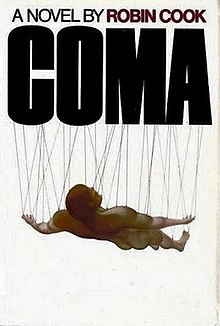Plot
Susan Wheeler is a third-year medical student at Boston Memorial Hospital. She and four other students take rounds in surgery rooms and ICUs, recording post-treatment notations on the patients' health. Dr. Mark Bellows, a surgery resident in the hospital, is the instructor and this group's supervisor.
The book is a journey into the inner workings of a hospital. As these students complete their three-month surgical rotation, the dilemmas and problems faced by a woman in a male-dominated profession are also highlighted.
Susan notices that two patients, Nancy Greenly and Sean Berman, mysteriously went into comas immediately after their surgeries. These were attributed to anesthesia complications. Nancy Greenly became comatose due to her brain receiving insufficient oxygen during surgery. Similarly, Sean Berman, a healthy young man in his 30s, underwent a knee operation. Despite the operation's success, Sean failed to regain consciousness. Medically, the odds for such occurrences are one in 100,000; however, such odds seemed resolutely higher at the Boston Memorial Hospital.
Baffled by these two patients, Susan investigates their cases and other recent coma victims. She discovers that the oxygen line to Operating Room 8 has been tampered with to induce carbon monoxide poisoning in patients during surgery, ultimately causing brain death. At the same time, Susan develops a brief, but intimate, relationship with Bellows and discusses her findings with him. After unraveling further details, and evading pursuit by a man hired to kill her, Susan is led to the Jefferson Institute.
The institute is hailed as an intensive care facility designed to reduce high medical costs. Patients declared brain dead or "vegetables" are referred to the institute. Here, Susan finds that patients are suspended from the ceiling by wires in rooms walled by glass, and moved from room to room with little human involvement. The "samples" are kept alive and healthy until a call for an organ comes in. The organ of choice is removed surgically (without family consent) and then sold on the black market.
Howard Stark, chief of the Department of Surgery at Boston Memorial, is revealed as the main antagonist. Stark confronts Susan over her findings, then drugs her, intending to put her in an irreversible coma under the pretext of an appendectomy. However, Bellows disables the "oxygen" line during the operation, thereby preventing a full dose of carbon monoxide poisoning. Stark is arrested, but Susan's fate is left in doubt.
This page is based on this
Wikipedia article Text is available under the
CC BY-SA 4.0 license; additional terms may apply.
Images, videos and audio are available under their respective licenses.
